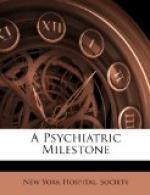In the brief history of the Hospital prepared by Dr. Russell we find the recommendations of another reformer, Dr. Earle, who in 1848 was evidently still not satisfied with the treatment provided for the sufferers from mental illness.
Both Mr. Eddy and Dr. Earle were influenced by their observation that even in those suffering from mania much of their behavior could not be described as irrational. If you will allow me I will quote a sentence of two from each.
Mr. Eddy said: “It is to be observed that in most cases of insanity, from whatever cause it may have arisen or to whatever it may have proceeded, the patient possesses small remains of ratiocination and self-command; and although they cannot be made sensible of the irrationality of their conduct or opinions, yet they are generally aware of those particulars for which the world considers them proper objects of confinement.” With reference to treatment Dr. Earle said: “The primary object is to treat patients, so far as their condition will possibly permit, as if they were still in the enjoyment of the healthy exercise of their mental faculties.”
To superficial observation these suggestions might well have appeared as the phantasies of dreamers and perhaps at the present day their importance is not always fully appreciated. Recent advances in knowledge, however, have led us beyond the moral treatment recommended a hundred years ago and have enabled us to see that a more important truth underlay these suggestions.
We are all familiar with the frequent difficulty we encounter in our efforts to discover the actual mental disturbance which is supposed to exist in our patients. It is often a question of wit against wit as between patient and doctor, and not infrequently a rational and intelligent conversation may be maintained on an indifferent subject. The fact too that the disturbance is so frequently only temporary suggests that the loss of rational control is a less serious phenomenon than was generally supposed and we know that the control can be frequently restored by a period of rest or by a helpful stimulus. Quite recently a patient who in hospital had been confused, undisciplined, abusive, and threatening, was removed to a house of detention. The shock of finding himself, as he said, amongst a lot of lunatics, led him to face reality from a fresh point of view. He admitted that it had taught him a lesson and when he revisited the hospital, if not entirely grateful to us for the experience, he evidently bore no ill will.
But not only is it necessary to recognize what rational powers remain to the patient, we must also inquire how much in their disturbed mental activity can be considered a rational reaction to the stimuli which have operated, and still may be operating, on them.
In connection with this I would suggest that there are two aspects to be considered. First, what is the standard according to which we are to judge them? Secondly, to what extent are the reactions of the patient abnormal in kind to the driving stimulus? They may perhaps be reckoned abnormal in degree, but, to what extent, if at all, are they abnormal in kind?




